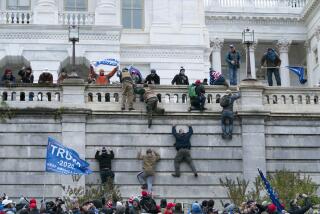‘Moyers on Democracy’ by Bill Moyers
Moyers on Democracy
Bill Moyers
Doubleday: 416 pp., $26.95
THERE’S A Jeremiah among us and his name is Bill Moyers. He is a product of Lyndon Johnson’s Great Society, having worked for the president and witnessed firsthand many of that administration’s achievements, including the Civil Rights Act, the Voting Rights Act, the Higher Education Act, the Public Broadcasting Act and the Freedom of Information Act. Earlier, he was deputy director of the Peace Corps. He left government to practice as a journalist -- principally a maker of documentaries -- and in the decades since has contributed enormously to the public weal. Noting that right-wing polemicists have long tried to tar “fact-based reporting that undermines their worldview” as “liberal advocacy journalism,” of which he is among the country’s prominent practitioners, he responds, “All I can say is that if reporting what happens to ordinary people because of events beyond their control, and the indifference of government to their fate, is ‘liberal,’ I plead guilty.”
Moyers believes, deeply, that we are in danger, and terrorism is not what has driven his threat advisory to level orange. Our government may not just be indifferent to the fate of its ordinary citizens but actually averse to serving them, for starters. The shredding (it is beyond fraying) of what was long understood to be the social compact is the simplest way to describe the common thread running through “Moyers on Democracy,” a collection of talks he has delivered at such diverse venues as West Point, the Jewish Theological Seminary and the Texas State Historical Assn. and as eulogies at various memorial services. They have been updated with introductory material to provide context; a few date to the 1980s, but most show what has been on Moyers’ mind in the last three years.
The book’s coherence stems from its repetition of interlocking themes -- income disparity, the influence of special-interest money, government secrecy, the failures of media to effectively fulfill their watchdog role, the expunging of historical context, the unequal access to decent education -- rather than from articulation of an extended, developed argument. In a 2003 speech (not included here) on progressivism, Moyers said, “I don’t harbor any idealized notion of politics and democracy. . . . But there is nothing idealized or romantic about the difference between a society whose arrangements roughly serve all its citizens and one whose institutions have been converted into a stupendous fraud.” By the end of this book, it’s clear why he begins it thus: “Democracy in America is a series of narrow escapes, and we may be running out of luck. . . . We have fallen under the spell of money, faction, and fear, and the great American experience in creating a different future together has been subjugated to individual cunning in the pursuit of wealth and power -- and to the claims of empire, with its ravenous demands and stuporous distractions.”
There is a communitarian line of thought (several, actually), discernible in the works of the philosopher John Dewey and animating the activism of Martin Luther King Jr., of which Moyers is a contemporary exponent. “Regarded as an idea, democracy is not an alternative to other principles of associated life. It is the idea of community life itself,” wrote Dewey in his essay “Search for the Great Community.” Moyers quotes King writing from the Birmingham jail: “We are caught in an inescapable web of mutuality, tied in a single garment of destiny. Whatever affects one directly, affects all indirectly.”
Unfortunately, commitment to a shared fate -- and perhaps even perception of that as a societal goal -- is one of the ties that may no longer bind. “I don’t need to tell you that a profound transformation is occurring in America,” Moyers writes, in a talk titled “America 101.” “And it’s man-made. Over the last thirty years a well-funded and closely coordinated coalition of corporate elites, power-hungry preachers, and hard-line ideologues has mounted an aggressive drive to dismantle the public foundations and philosophy of shared prosperity and fairness in America.” He readdresses the point in “A Vision of the Future,” in which one sees the modulation of his thought: “Our challenge is to create a political culture that nurtures obligation, reciprocity, and trust, to bring about policies that have wide public support.”
Moyers deplores the outsized policy influence of the religious right but is himself religiously cast and sensitive to the tension between religious and secular approaches to public life. One of his suggestions is “to find a new vision for America which has the authority and power of a religious vision but which is inclusive -- not sectarian. . . . How can we be properly enthusiastic -- how do we honor the religious sense -- without denying reason?”
He deals with the abandonment of urban education, argues for public financing of elections, details lobbying scandals, dirty congressional dealings and anti-environmental acts by the current administration, and -- in the notable commentary delivered to cadets at West Point -- raises George W. Bush’s “extra-constitutional claims of authority,” including the right to deviate from the Geneva Convention “at his pleasure, so as to allow indefinite and secret detentions and torture,” along the way reminding these future officers not to let their “natural and commendable loyalty to comrades-in-arms lead you into thinking that criticism of the mission you are on spells lack of patriotism.” Scarcely a month after the 2001 terrorist attacks, he is asserting: “Let’s face it: the predators of the Republic present citizens with no options but to climb back in the ring. We are in what educators call ‘a teachable moment.’ And we’ll lose it if we roll over. Democracy wasn’t canceled on September 11, but democracy won’t survive if citizens turn into lemmings.”
One of the delights of “Moyers on Democracy” is that the voices of others appear in its pages, some posthumously. Not that Moyers has a dull narrative voice -- it is personal and reflective and bespeaks significant personal integrity -- but he also peppers his talks with anecdotes from his life, which has been fascinatingly circuitous. It is a treat to hear Lady Bird Johnson, on a whistle-stop tour of the South after her husband has signed the Civil Rights Act, gamely enduring insults and telling one crowd she was sure what she heard came “not from the good people of South Carolina but from the state of confusion.” Or the late antiwar and anti-nuclear activist minister William Sloane Coffin, who told Moyers, “When you see uncaring people in high places, everybody should be mad as hell.”
Moyers is fully aware of the shortcomings of the press -- among them, concentration in ownership and declining resources for investigative work -- and more than once discusses them. He concedes that his own medium, television, often lacks context for the news it does report and “helps to make this an anxious age of agitated amnesiacs.” An informed public has been assumed to be an essential ingredient of the democratic recipe since the beginning of the republic, and yet Moyers concludes of the Fourth Estate that “[b]y no stretch of the imagination can we say the dominant institutions of today’s media are guardians of democracy.” He reminds us that it is proximity to reality, not to power, that should matter in reporting, and the hopeful note he sounds is this: Although we are in what he terms another Gilded Age, the last one brought terrific, muckraking journalism in its wake. *
More to Read
Sign up for The Wild
We’ll help you find the best places to hike, bike and run, as well as the perfect silent spots for meditation and yoga.
You may occasionally receive promotional content from the Los Angeles Times.










